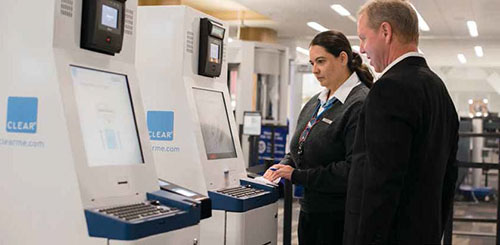Orlando Int'l Gives the 'All-Clear' to Private Registered Traveler Program

For frequent business travelers, clearing Security quickly is just as important as on-time departures and arrivals. But all too often, it's a game of "hurry up and wait."
|
factsfigures Project: Registered Traveler Program
Location: Orlando Int’l, Westchester Co. Airport, Program Provider: Alclear Service Name: CLEAR Membership Fee: $179/year
Benefits: Expedited screening; individual customer |
If they arrive at the airport two hours prior to departure as recommended, they might end up sitting in the terminal for an hour and a half if there's no wait at the screening checkpoint. But if they cut their arrival time too close and security lines are long, they risk missing their flights altogether.
It's a conundrum officials at Orlando International (MCO) and other airports have taken a hard look at after 9/11, when screenings became a more involved and lengthy process.
MCO modified its strategy in 2010, when it became one of the first airports in the nation to adopt a privately run registered traveler program. The CLEAR program vets frequent travelers' identification documents in advance, uses biometrics to verify their identity at the airport, and allows them to jump to the front of the line at security checkpoints.
Travelers pay $179 for an annual membership, a portion of which is shared with participating airports. MCO, for instance, receives $40,000 to $60,000 per month from the program, reports Jim Rose, deputy executive director of business services/facilities for the Greater Orlando Aviation Authority. The percentage of fees shared varies by airport.
Revenue aside, Rose says that the program supports the airport's goal of providing better customer service. "It provides convenience for the frequent traveler," he relates. "While we do gain a revenue stream by partnering with CLEAR, that's not the most important factor. The most important reason for this is to provide an easy process for our regular customers to pass through security."
Rose estimates that the entire security checkpoint process averages less than five minutes for CLEAR members at MCO.
Some consider CLEAR the private-sector cousin to TSA's Pre-program, which also pre-registers passengers for expedited security clearance. MCO, which participates in both programs, enthusiastically embraces the private alternative. "The CLEAR program has enhanced our passenger screening process," says Rose, noting that the service allows participants to move through security lines with ease.
Speeding Screening
MCO, which ranks as the 13th-busiest U.S. airport, screens 35.4 million passengers annually via two major checkpoints. Business and business/leisure travelers represent up to 40% of the airport's traffic, estimates Rose.
Adding a CLEAR checkpoint to the checkpoint on the east side of the terminal affords members quick and easy access to identification document checkpoints and X-ray screening, explains Rose. "CLEAR program passengers essentially move to the front of the line," he adds.
While CLEAR doesn't replace the need to go through TSA checkpoints, it speeds the overall process. Once a member verifies his or her identity, an attendant the company trains in hospitality service escorts the passenger to the line for physical screening by X-ray machines and magnetometers.
Second Chance
CLEAR is not a new service, but rather the resurrection of a previous program run by Verified Identity Pass. Steven Brill, who also founded Court TV, started the original passenger service in 2005. After enjoying initial success, amassing about 200,000 members and operating in 19 airports, the program ceased operations in 2009 due to financial problems.
In April 2010, Alclear bought the assets of Verified Identity Pass for $6 million and resumed the service at Denver International Airport and MCO the following month. Since then, more than 850,000 travelers have verified through CLEAR lanes, notes Ken Cornick, president and chief financial officer of the company.

"The revenue they receive is pure profit," Cornick notes. "It comes from subscriptions. We have paid out more than $2 million in revenue to our partners since we've launched."
CLEAR enticed old customers to return by lowering the annual fee $20 from the Verified Identity Pass rate and honoring the time they had left in their membership when Verified Identity Pass shut down.
Most members had three to nine months of service left on their accounts, but a few had purchased 10-year plans, notes CEO Caryn Seidman-Becker. To date, more than 80% of the former customers have come back, she adds. Members in Orlando got their first year free.
"Our members love this program," says Cornick. "We've gotten really positive feedback about it. When the previous company shut down, they really missed the service."
MCO is seeing membership climb, and officials there anticipate that growth to continue as more airports add the program. More than 17,700 passengers passed through CLEAR access points at MCO in September alone, reports Rose.
Working Out the Details
CLEAR uses proprietary software to provide security for member information. To enroll, passengers provide basic demographic data online or at a CLEAR kiosk at the airport. Next, they validate their identity at the airport with two forms of identification, generally a passport and driver's license, and a kiosk attendant captures their fingerprint and iris images. Each member's biometric information is then encrypted and put onto his or membership card.
Once enrolled, program participants go to a manned CLEAR checkpoint, insert their cards into the kiosk and place their fingers on the fingerprint reader or look into the iris image reader. Members can select which biometric they prefer to use each time they fly.
The entire check-in process takes 10 seconds or less, and proceeding through security lines usually takes about five minutes, Cornick says, echoing Rose's estimate. "We provide the certainty that if you leave your meeting at a specific time and head to the airport, you have a predictable amount of time to get through Security," he explains. "You don't need to arrive at the airport two hours early just in case there is a long line at security checkpoints. In Orlando, members have told us they can arrive about 40 minutes before a flight instead of two hours."
Lost or stolen membership cards are not a cause for concern, notes Cornick. "There is no risk that their information will be compromised," he explains. "The card stores just ones and zeros, not actual identity information."
The program, he adds, is the only expedited traveler service to receive U.S. Department of Homeland Security Safety Act Certification. Although it took years to secure, CLEAR is now on the department's approved product list.
Elsewhere on the Airport
An exclusive partnership between CLEAR and Signature Flight Corp., a network of fixed-base operators and distributor of business aviation services, demonstrates the program's application to the general aviation sector. The agreement includes six-month free trials and discounted memberships ($99 per year) to Signature employees.
The service will help repositioning flight crews and commercial customers move through airports more quickly, explains Patrick Sniffen, vice president of marketing for Signature. When Sniffen personally tested the program's enrollment procedures, he received his membership card in the mail within four days of registering.
As additional airports and aviation entities embrace CLEAR's pre-registration and biometric system, "hurry up and go" may soon replace "hurry up and wait" for frequent business travelers in a variety of U.S. markets.
FREE Whitepaper
PAVIX: Proven Winner for All Airport Concrete Infrastructure
International Chem-Crete Corporation (ICC) manufactures and sells PAVIX, a unique line of crystalline waterproofing products that penetrate into the surface of cured concrete to fill and seal pores and capillary voids, creating a long lasting protective zone within the concrete substrate.
Once concrete is treated, water is prevented from penetrating through this protective zone and causing associated damage, such as freeze-thaw cracking, reinforcing steel corrosion, chloride ion penetration, and ASR related cracking.
This white paper discusses how the PAVIX CCC100 technology works and its applications.









